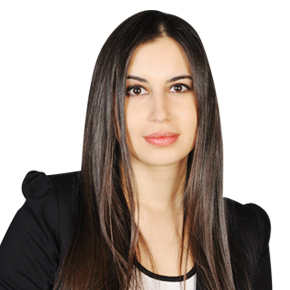During my two-year stay in Turkey (I am working on my master’s thesis on the Armenian Genocide at the Faculty of Political Science at Ankara University) I have been surrounded by and have been communicating with Turks, and every day I am getting more and more convinced about the need for communication and dialog.
One of the main issues of the Armenian-Turkish relations is the lack of reliable information, which poses communication barriers. It is peculiar to both parties.
Turkey, which is a large country with a very heterogeneous culture and a population of 75 million, has set itself a task to enter the top 10 of world economies by 2023 (by the centenary of the Conference of Lausanne). When talking about Turkish public opinion we should take into account its intrinsic ethnic diversity (the everyday increasing Kurdish population the number of which already varies between 13-15 million) as well as the confessional differences between the Alawites, Sunnis and Shiites.
The Turkish society is ideologically very diverse. It includes Kemalists (advocates and “soldiers” of Ataturk), Left-Kemalists known for their anti-governmental activities, regular mass meetings and protests; supporters of Gulen who severed relations with Erdogan’s party once and for all; Turkish nationalists and Pan-Turkists and relatively new but already quite successful Kurdish twin parties – Peace and Democracy Party (BDP) and People's Democracy Party (HDP), which unite Kurds as well as the rest of ethnic minorities and Armenians are no exception. It should be recalled that HDP Chairman Selahattin Demirtas stated he will recognize the Armenian Genocide if elected a President. The list is incomplete, but even this incomplete list shows how manifold and explosive the social-political life of Turkey is, and any generalization will be a gross error.
Importantly, we should also understand that for the majority of Turkish citizens, the Armenian Question comes in the last places of the country’s priority ranking. The unresolved Kurdish question, restless Syria and Iraq with radical Islamists, the goal to morph into one of top economic countries and the unrecognized Northern Cyprus are way more important for Turks. The fact this diversity increased even more under the rule of Justice and Development Party (JDP) is especially important.
Many Turks have a surprising level of ignorance to even elementary issues related to Armenians. I met people who really had no idea of which the capital of Armenia is, and many of them did not even know that the Armenian-Turkish border is closed. But at that, the palm of supremacy should be awarded to a café owner who thinks that Armenians and Azerbaijanis are “sister nations”. But who should be accused of this situation? Should we blame the Turkish Republic, which has been intentionally conducting such a policy for already 100 years, the nation which studied using Turkish textbooks at Turkish schools and never met an Armenian, or should be blame Armenians who refuse to communicate with Turks until they utter the word “genocide”?
Here is a widely shared view any average statistical Turkish citizen will express – during World War I Armenians betrayed Turks and came over to Russia’s side. No Genocide was committed and moreover, all that is guileful Europe’s traitorous policy against Turkey. People have no information about Western Armenia – the cradle of the Armenian civilization. They also do not know about Armenian history prior to 1915, and as to Armenia’s post-1915 history, they know only one thing – ASALA (Armenian Secret Army for the Liberation of Armenia). It’s where their knowledge of Armenian history starts and ends.
Amidst all this when Turkish intellectuals such as Hasan Cemal, Cengiz Aktar and Ali Bayramoglu risk their lives in an attempt to break down the barriers of misunderstanding and resistance and to change something in the Turkish society, they are stigmatized as “champions of Turkish interests”, instead of receiving support from Armenians. Is it how we thank those who are trying to show their sympathy for the Armenian society? It’s an unhealthy situation.
I do my best to actively engage in various conferences, especially if there is a chance to address a speech or get to know people. It would be no exaggeration if I say that as soon as people at a certain meeting learn there is a person from Armenia among them, the entire attention switches to that person. Many people have approached me asking to send them Armenian Genocide materials and tell them how people live in Armenia. Some of them also expressed their wish to visit Armenia but at the same time, they voiced a concern they might face serious issues there. Some of them were Kurds, and as a rule, their speeches used to start like this: “Our Kurdish ancestors have ruthlessly maltreated Armenians and we are very ashamed of it. I hope you will be able to forgive us one day”. How can I meet their wishes? After all, after talking to me these people will share new information in their surrounding, and it is highly important.
Let’s briefly review Armenia. It’s a tiny country blockaded from two sides and has a population of 3 million (to compare, the population of Ankara reaches 5 million and the population of Istanbul – 15 million). Armenia’s deeply traumatized nation finds its only relief in being the first Christian nation in the world and strongly clings to the past, to the times of fame and prosperity. Armenian people’s perception of Armenian-Turkish relations can be called a “historic trauma”. Expressions such as “a Turk will always remain a Turk” or “never trust a Turk” are a good example of that. To date, we perceive Turks the same way we used to perceive 100 years ago. We refuse to communicate with Turks but we want them to recognize the Armenian Genocide. How will they recognize it if we do not carry on a dialog with them and label those trying to do something in this difficult situation and to achieve a breakthrough as “enemies” or “agents”? I still remember that the Armenian media were soiling Hrant Dink who was working up to the collar to bring the two nations to carry on a dialog. The classical Armenian scenario is: “We know not what is good until we have lost it”.
Summing up, I would like to write about an incident which strongly affected me and gave me a hope that the Turkish society is changing and we should not reject the dialog.
Members of various antiracist movements had a meeting in Istanbul in April 2014. Members of EGAM (European Grassroots Antiracist Movement), DurDe! (Say Stop to Racism and Nationalism!; Turkish movement combating racism in any form), HRA of Turkey (Human Rights Association of Turkey; joined the campaign in 2014) and AGBU (Armenian General Benevolent Union) were present there. They worked out a long-term program aimed at raising awareness about Armenian Genocide in Europe and Turkey. The program was very intense – conferences dedicated to the Armenian Genocide were held at various universities in Istanbul, and the delegation had a meeting with Turkish and Kurdish activists lobbying the recognition of the Genocide. On April 24, hundreds of people gathered at the main square of Istanbul – at Taksim Square – with the portraits of the Armenian intellectuals who were among the first Genocide victims. As Hrant Dink used to say, “Compared to the Armenians of the Diaspora and Armenia, Turkish Armenians are deprived of the opportunity to honor the memory of the Genocide victims. They do it in silence, at home”. It’s a pity that Hrant Dink is not alive and he will not see the hundreds of people that gathered in the center of Istanbul, the same Istanbul which will never be the same as before.
Talking to people I get more convinced that it’s a great mistake to pass the traumatized past from one generation to another and to firmly refuse to break the outdated stereotypes. The trauma of the Genocide is very profound, and the denial of the Turkish politicians intensifies our pain, nevertheless, we should not focus on only this. In order to overcome this situation, we should communicate with real people and not the ghosts of 100-year-old recollections.
Diana Yayloyan is a Master Student in International Relations, Ankara University.These views are her own.






















Comments
Dear visitors, You can place your opinion on the material using your Facebook account. Please, be polite and follow our simple rules: you are not allowed to make off - topic comments, place advertisements, use abusive and filthy language. The editorial staff reserves the right to moderate and delete comments in case of breach of the rules.